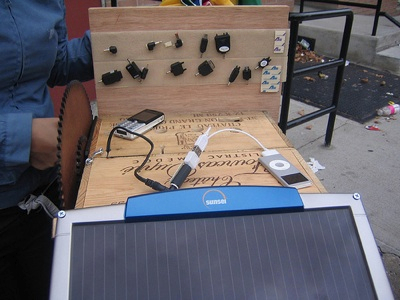Improvised Technology
Home-made Camera for Ogling
Nice piece in the New York Times about a Czech photographer who worked in the 60s and 70s using homemade cameras, one of them shown here. They are a wonderful example of street use. The Times said, “he fashioned them from shoeboxes, toilet-paper rolls and plexiglass, polishing the lenses with toothpaste and cigarette ash.” The guy was a bit of a pervert. He took low-res images of pretty girls on the street, in cafes, and on buses. “His photographs may look naïve, but they’re the product of a carefully orchestrated series of missteps that begins with crude, homemade cameras. As he says in the film, “If you want to be famous, you must do something more badly than anybody in the entire world.”” Still, his cameras are cool.
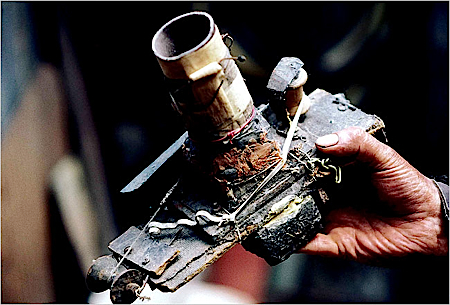
Jailhouse Tech
There’s an emerging category of street technology which might be called Jailhouse Tech. The material constraint of a prison inspire fantastic innovation and re-use of made parts. A lot of the devices made in this manner are crude weapons, but others include eating implements, tattoo instruments, music, and other tools. Here are some examples from a prison in Mexico City by Gabriella Gomez-Mont.

Electric cooking stove made with wire and brick.
From the fantastic interview with the artist who works in this prison and who facilitated the photographer who shot these images:
Now that it is over and done with I can tell you this. For the eight prisoners that helped us it would have easily meant another extra seven years in jail, and for us instant lock-up until they set bail. Especially because of having in our possession—or even presence–those knives made from the metallic edges of the windows! In there, they menace and kill people with those, we would all gotten into so much trouble if we had been caught with them. I don’t even know if those particular knives that we photographed that day had already been used for some sort of bloody business or not, I preferred not to ask; but it would have been even worse.
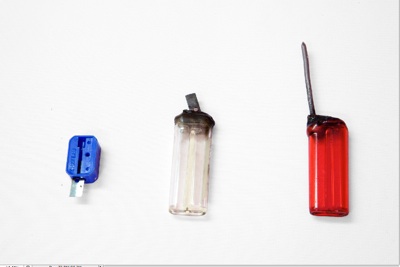
Weapons.
Street Food Contraptions
Dornbracht, a German manufacturer of bath and kitchen fixtures is presenting a exhibit called “Global Street Food” which has removed street food carts from the streets and spotlighted them in a gallery on Dornbracht’s campus.
I wish I had thought to photograph the many wonderful carts I had seen in my travels, but it never occurred to me then.
Here is grill from Kampala, Uganda.
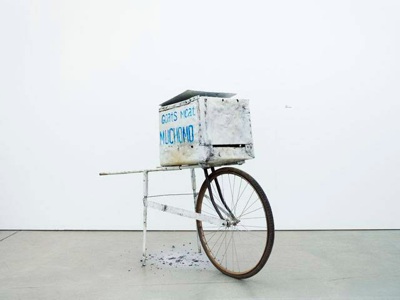
And a cheese and sausage cart from Buenos Aires.
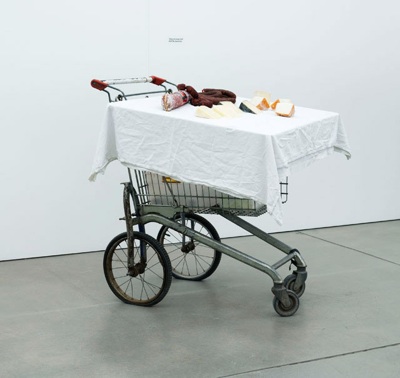
If you have photographs of interesting street food carts send (or point) them to me, and I’ll post.
Improvised Polish Hot Water Setup

This picture of a jury-rigged hot water delivery system from Poland is pretty cool. I bet it works. (Ignore the label, it is meaningless, added by the website Fail Blog, where I found the picture. Thanks, Ross Beane. )
Improvisation in Thailand
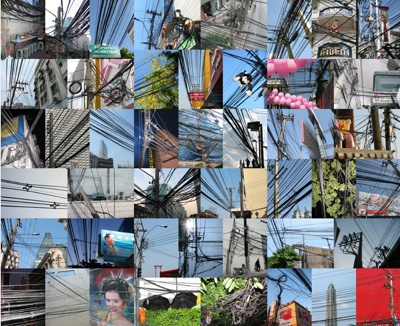
Thomas Kalak is a photographer from Munich, Germany who specializes in the offbeat. His subject is the curious art of found technology. He’s accumulated a magnificent gallery of old American cars in Cuba called “Havana Oldtimers“. In Thailand he focuses on the often-seen but rarely-noticed jumble of wires that weave their way overhead every street. Adhoc in design, these almost organic nests have their own charm if you let them seduce you. Kalak has collected an entire portfolio of Bangkok Wires.
These and more are included in a new book about Thailand called “Thailand — Same Same, But Different. No cliches here. No lovely maids, palm beaches or grand temples. Instead Kalak captures odd moments of street use. Plastic chairs in alleys; traffic cone patterns. Even the locals are blind to their off-center beauty. Kalak has a keen eye for the way folks improvise. I think of this work as improv zen.

The ubiquitous plastic bag becomes an instant cheap bottle if you add a straw. And you can hang it anywhere.

Owner-built key ring boards.
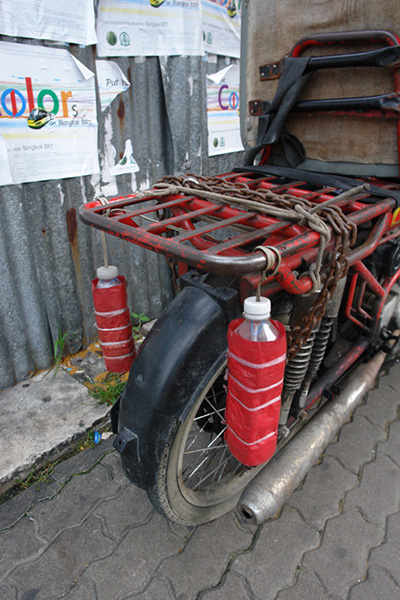
I think these are home-made brake lights. Suspended by a wire, a bulb inside a bottle covered with read plastic will light up at night.

Filled with water this can keeps the table cloth from blowing away.
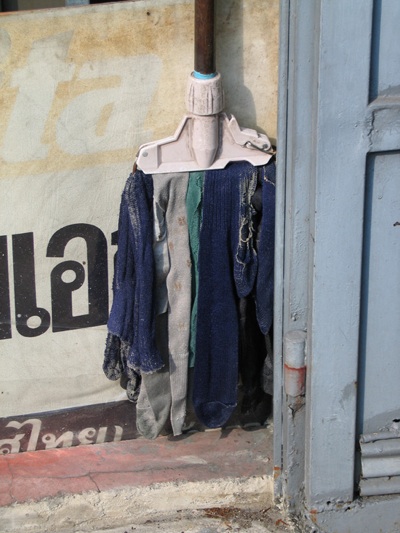
A mop made from old socks!!
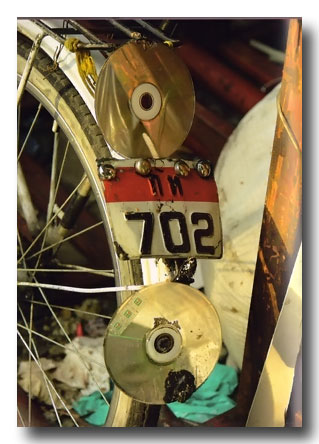
Reflectors made from CDs.
One Gate, Multiple Locks
What do you do if you have a locked gate but more than one person is permitted to open it? You don’t want multiple keys, in case one is lost/stolen. Then all the keys may need replacing. Instead you can have multiple locks, chained into one long lock. Open any lock to open the gate. This way each person needs to manage their key (and lock). I’ve seen various installations on this solution in different parks in the Bay Area.


ATM cage
It makes sense you’d protect an ATM like it was a bank. In fact why don’t all ATMs look like this one, found on Flickr?
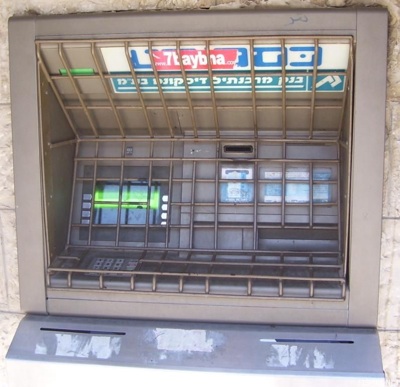
Portable Large Sound System
Pico are hand built sound systems erected in chiva, or local bus/truch transport, in Cartegena, Colombia. The large speakers and boom boxes are tricked out like juke boxes, and the entire brightly painted chiva becomes a music hall. I could only find a few photos (email me if you find more). Here is an abstract of a scholarly examination of the tech culture.
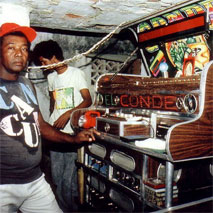
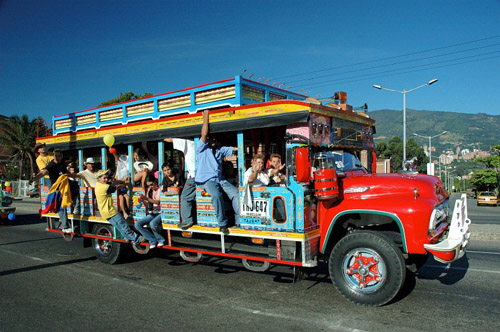
Sound Systems, World Beat and Diasporan Identity in Cartagena, Colombia
Deborah Pacini Hernandez in Diaspora: Volume 5, Number 3, Winter 1996
Afro-Caribbean music plays a large role iin Cartagena, Colombia, a city with a large population of African origin. Hernandez details the ways in which the Colombian recording and broadcast industries resisted the dissemination of such music, and discusses the material practices centered around picos, locally constructed sound-systems, through which African-Colombians acquired, reproduced, disseminated, and transformed recorded diasporan musics. She notes that the black Cartageneros’ production of such music systems preceded the appearance of world beat in northern contexts by almost a decade, and traces their acknowledgment of and participation in a diasporic Afro-Caribbean identity based on musica africana.
Great Minds Think Alike: the Bicycle Lawnmower!
Over at Treehugger, Warren McLaren has rounded up all the examples of this ingenious, indigenous, “labor-saving” invention that he could find.
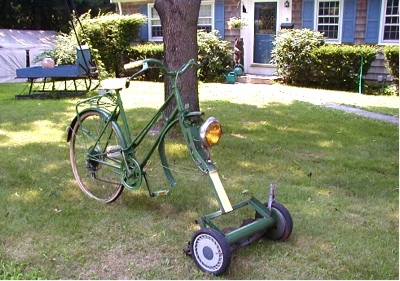
It is apparent that thousands of people who have to mow the lawn decided there must be an easier way and had exactly the same idea: Why not hook the mower to a bike? And so the bikemower is born in a thousand of garages around the country. Judging from the pictures, they are still in the garages. Most of the pics rounded up by McLaren look as if they were taken at garage sales. I have my doubts that the bike mower is very useful, or easier to use than pushing on your feet.
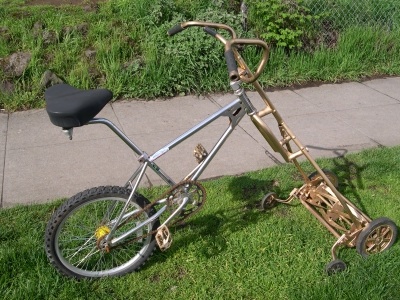
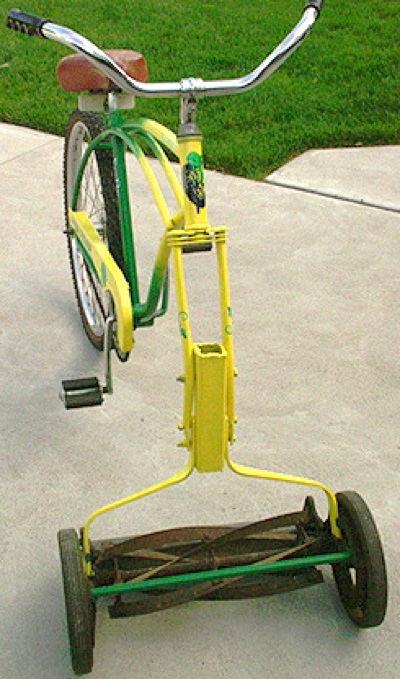
For the full set see the Treehuger post above.
Power Cart
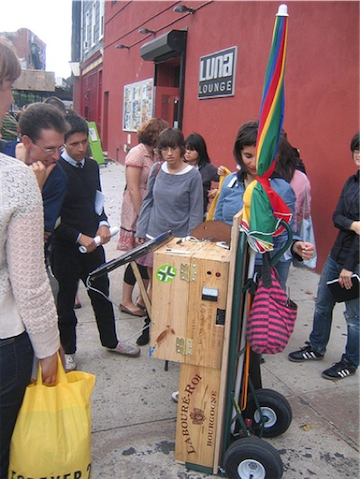
This prototype of a prototypical street cart is artist Mouna Andraos’ idea. From the artist’s proposal: “An old idea from yesterday’s streets adapted to serve the needs of today’s urban dwellers, the Power Cart is a mobile unit that delivers alternative power to people in the streets. Street vendors have traditionally played an important role in defining the urban environment and often speak to the current social and cultural context of a city. In most parts of the world (and if the weather permits it), the street is a place where social interactions abound and where commerce rules, and street vendors around the globe bring to local populations the things they need right at their door steps. Knife sharpening in India, refills of gas in Africa, fake Gucci bags in Paris and chair massages in New York, the Power Cart looks and feels like another service for the city of today. Need a charge on your cell phone? Your laptop is about to die and you really need to check that email? Or maybe there is no power around you at all? Where ever you might be in the world, hail the Power Cart for a quick fix. Let the Power Cart owner turn the crank for you and get the electricity you need, one minute of cranking at a time.”
